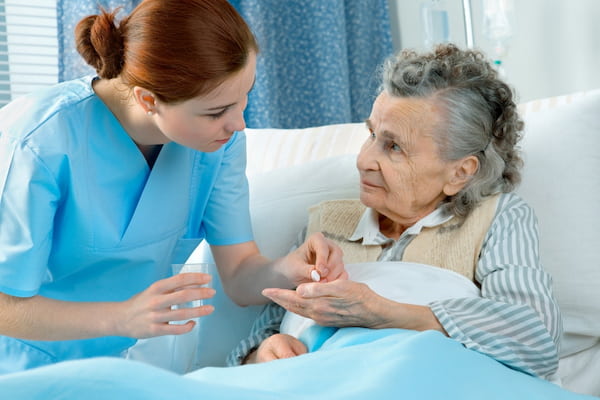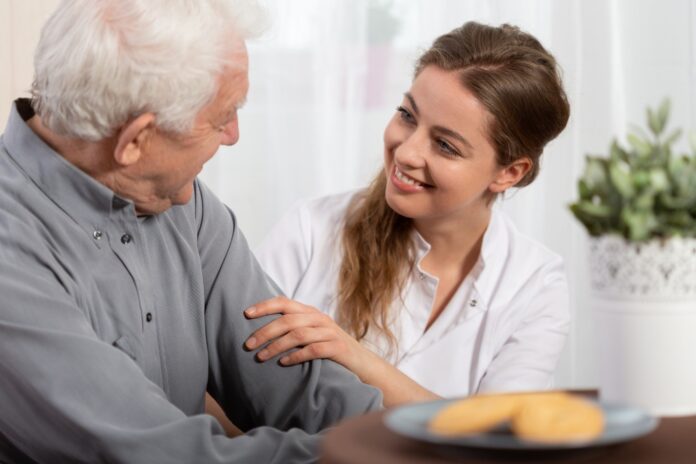Cerebral vascular accidents or strokes can be abrupt, and they can leave loved ones upset when all of a sudden, they find their elderly in a weak state. Blood supply can be abruptly interrupted, and without warning, because the arteries may partially, or completely block the flow from going to the brain, and you can see more about the signs on this site here.
Bleeding or hemorrhage may also occur, and the overall effects are going to depend on the affected location as well as the severity of the tissue damage to the nervous system. It can leave a patient in a persistent vegetative state, in a coma, or a reduced level of consciousness. Worse cases can even result in death.
How Stroke Affects the Body?
Death of the brain cells can be the result of a restricted blood supply to the brain. Life-threatening instances may happen if the blockage involves heartbeat and breathing. There’s a risk that someone can experience a stroke a second time, and it can make them very ill. Physicians and nurses may work on the treatment of heart problems or the possibility of a blood clot.
Brain swelling can also be dangerous, but this can be removed through surgery. Most people can’t make a decision by themselves if they reach this state, so the doctors tend to work with the family for the best course of action to take. Hospice treatment and appropriateness are generally determined after about three days of the initial consultation. Abnormal responses are taken note of, and if there is painful stimulation and the patient does not respond, then this could mean trouble. Incidents like this can double after an individual reaches the age of 55 or more. Understanding what constitutes these diseases in the brain and how the tissues are affected will help the caregivers know what they are facing.

Getting Support Even in Coma
Patients who have woken out of a coma have said that they were not aware of what’s happening around them. However, they say that they still recognize, and become comfortable when they hear familiar voices, even if they are unconscious. Read info about coma at this link: https://kidshealth.org/en/kids/coma.html.
Caregivers should never be afraid of talking to them even if they seem to be “sleeping.” Think as you would normally do, and your loved one may be able to hear what you’re trying to convey to them. Familiar scents from perfumes and physical touch can make them more comfortable, and it would help if you can stimulate their senses with their favorite music.
Any movements like a flickering of the eye or a quick grasp of your hand may not always be a sign of improvement. This can happen to a lot of people who are in a deep coma, but these are all positive signs that everyone should look forward to.
Scale measures like the Glasgow Coma have allowed healthcare workers to determine the current state of their patients. Spontaneous opening of the eyes or no movements at all might be ranked from 1 to 4. Getting responses to direct verbal commands can rank a patient that’s talking and alert at a score of 5, and voluntary actions in response to questions and requests may also have a higher score.
Feeling painful sensations, blinking, hearing loud noises, and other reflexes may come back after the patients wake up from their coma. Normal breathing and sleeping are observed, but they may be slow to gain more awareness of their environment.
Palliative Care: What is It About?
Specialized treatments are available for people who have experienced a stroke and are having a difficult time in their recovery. A good stroke palliative care will understand the unique needs of your loved ones, and they will see if there are symptoms present, like slurred speech, arm weakness, and drooping face.
Minimizing most of the symptoms, like helping alleviate a patient’s headaches and troubled speech, can be part of a palliative program. Obtaining the right treatment on the first instance of stroke can mean individuals can minimize some of the issues and prevent them from becoming worse.
Living with a stroke victim is very difficult since they tend to have issues with their movements, as well as their use of the muscles. Spasms can be painful at times and the doctor can recommend prescription drugs that can block these nerve reactions to help the patient live comfortably.
Explanation of the advantages and side effects of a specific medication to the other family members is part of the healthcare workers’ job, and they will also show the right way of caring for the loved ones. Counseling can also help people to have a clearer view of what they should do in the future, and the experts will also craft a realistic plan that may consist of getting the services of skilled nurses or assisted living.
Read Also
- The Role of Ingredients in Your Skincare: What to Look ForSkincare works best when you understand what goes into the products you use daily. Ingredients form the foundation of every formula and determine how the skin reacts over time. Each cream, cleanser, or serum has its own role, determined by its ingredients. Learning what to look for helps you pick products that help skin and… Read more: The Role of Ingredients in Your Skincare: What to Look For
- Your Guide to Finding a Trusted DentistChoosing the right dentist in Sandgate or your area is crucial for maintaining good oral health and achieving a confident smile. With countless dental practices to choose from, patients may find the task daunting. Data from the American Dental Association indicates that there are over 200,000 practicing dentists in the United States, highlighting the importance… Read more: Your Guide to Finding a Trusted Dentist
- Achieving a Defined, Balanced Facial Contour in SingaporeA well-defined jawline and a gently tapered lower face — commonly referred to as a V-shaped face — is a look many people aspire to. In Singapore’s beauty and aesthetic scene, treatments that help refine facial contours have grown in popularity as more individuals seek subtle, natural enhancements that boost confidence and balance facial features.… Read more: Achieving a Defined, Balanced Facial Contour in Singapore
- The Wellness Blueprint: How Your DNA Holds the AnswerGenetic testing is revolutionizing preventive healthcare by offering insights into individual health risks. By analyzing DNA, these tests provide a personalized health blueprint that can guide lifestyle and medical decisions. This approach, often referred to as DNA wellness testing, helps to optimize health naturally and prevent potential diseases. In recent years, genetic testing has become… Read more: The Wellness Blueprint: How Your DNA Holds the Answer
- Exploring the Benefits of Infusion Therapy in OKC: The Ultimate GuideUnderstanding Infusion Therapy: A Deep Dive into Its Purpose and Process What exactly is Infusion Therapy? Infusion therapy is an advanced medical treatment that delivers medication and nutrients directly into the bloodstream through a vein, typically via an IV (intravenous) line. This method is particularly beneficial for patients who require a concentrated dose of medication,… Read more: Exploring the Benefits of Infusion Therapy in OKC: The Ultimate Guide






